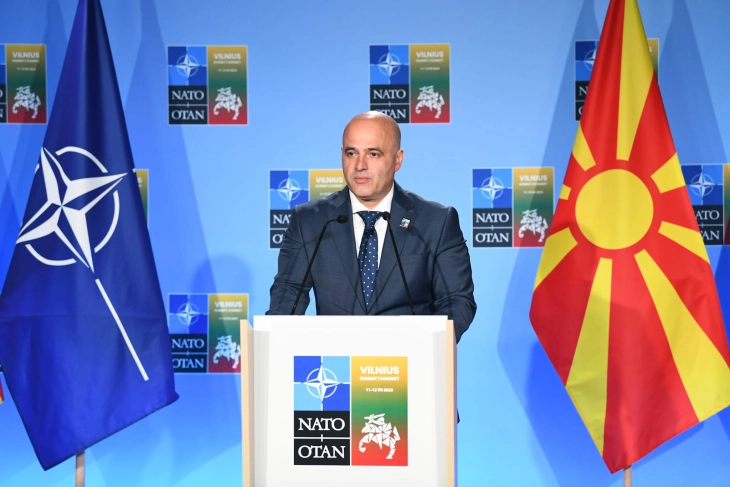Country to reach 2% GDP defense spending target in 2024, Kovachevski says
- North Macedonia will meet its two percent GDP defense spending target in 2024, in line with the NATO member states' pledge to spend a minimum of 2% of their economic output on defense, Prime Minister Dimitar Kovachevski told a press conference held at the end of the NATO Summit in Vilnius, Lithuania.
- Post By Magdalena Reed
- 21:48, 12 July, 2023

Vilnius, 12 July 2023 (MIA) — North Macedonia will meet its two percent GDP defense spending target in 2024, in line with the NATO member states' pledge to spend a minimum of 2% of their economic output on defense, Prime Minister Dimitar Kovachevski told a press conference held at the end of the NATO Summit in Vilnius, Lithuania.
According to MIA's special reporter from Vilnius, 11 member states have already met this target, with some of them exceeding it. Asked if North Macedonia was able to reach the 2% goal, Kovachevski said the country's medium-term budget framework set the objective of allocating EUR 304 million to defense spending in 2024.
Currently, he noted, 1.85% of national GDP, or a total of EUR 274 million, was being spent on defense.
"Our new investments will help strengthen our defense capacities in dealing with terrorism, with growing cyber and hybrid threats as well as with technology abuse," Prime Minister Kovachevski said.
Speaking about the recommendation to earmark 20 percent of the defense budget for modernizing the army, Kovachevski said North Macedonia was now spending 30 to 33 percent on this goal.
"This means new military equipment, procured exclusively from the USA, France, Germany, some of it from Turkey — from NATO member countries — which is modern and also used by other armies. At the same time, this also includes our investments in army facility renovations and increasing army members' salaries, which in the past years, especially since we became a NATO member, have reached a really high level, the prime minister said.
He said some NATO member countries were spending more than the minimum 2% on defense, depending on their GDP and the structure of their armies. But North Macedonia, he said, would be able to meet the 2% minimum that the allies pledged in Vilnius.
Summarizing the two-day summit, Kovachevski said he had held two bilateral meetings on its sidelines — with Estonian Prime Minister Kaja Kallas and Greek Prime Minister Kyriakos Mitsotakis — as well as numerous informal meetings with presidents and prime ministers of NATO member states, including "the leaders of the EU, Ukraine and close partners from the Indo-Pacific, Australia, Japan, New Zealand and South Korea," he said.
"As leaders of NATO member countries, we have made key decisions that will strengthen our collective defense and all our citizens' security," the prime minister said, adding that allies had adopted regional collective defense and rapid response plans and confirmed NATO's decision to continue supporting Ukraine.
"We have a very clear position that North Macedonia will always support Ukraine's right to defend itself and protect its independence, sovereignty and territorial integrity," Kovachevski said.
"As a newer NATO member country, we are strong supporters of its open door policy," he added.
Regarding North Macedonia's support to Ukraine, he said the country provided both military and non-military aid to Kyiv.
Kovachevski also spoke about the cooperation between NATO and the EU, saying it was essential in maintenaing security and stability in the region.
"North Macedonia, as a NATO member with open membership negotiations with the EU, has indisputably been a factor of stability in the Western Balkans," the PM said, added that this was the reason NATO and the EU were actively working and fully committed to supporting the country's efforts to achieve its second strategic goal of full EU membership.
"In translation, this means that any political obstructions — above all by our country's opposition, especially VMRO-DPMNE, both in terms of blocking reforms and refusing to cooperate on the constitutional amendments decision — are directed against our joining the EU, and subsequently against NATO and the region's stability and security. This is clear to everyone here; to our NATO allies and partners in the EU who are here with us today," Kovachevski said. mr/







